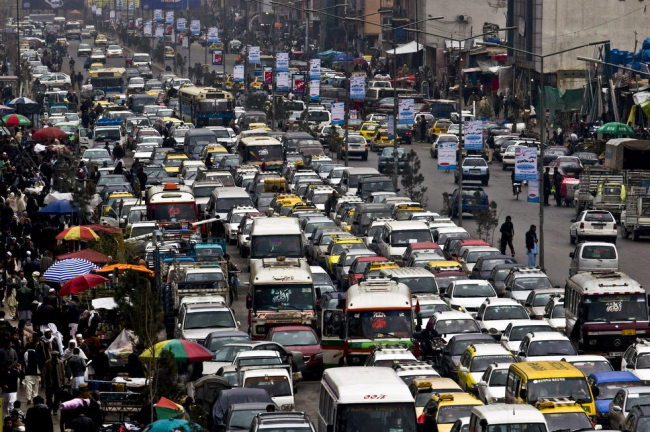Addressing traffic problems in Kabul key to Afghan security
By Korea HeraldPublished : July 7, 2013 - 20:36
Facing down the snarled traffic that is an everyday headache in Kabul will be crucial for President Hamid Karzai to win the peace after the U.S.’ planned withdrawal in December 2014, according to the country’s transport minister.
Afghan Minister of Transport and Civil Aviation Daoud Ali Najafi was in Seoul last week to ink an MOU with his South Korean counterpart, Minister of Land, Infrastructure and Transportation Suh Seoung-hwan.
“One way to help Afghanistan win the peace is by better providing government services for the people and by solving social problems. Transport and traffic are social problems. Solving these kinds of social problems will definitely help the security situation,” Najafi said in an interview with The Korea Herald at the Afghan chancery on Friday.
Afghan Minister of Transport and Civil Aviation Daoud Ali Najafi was in Seoul last week to ink an MOU with his South Korean counterpart, Minister of Land, Infrastructure and Transportation Suh Seoung-hwan.
“One way to help Afghanistan win the peace is by better providing government services for the people and by solving social problems. Transport and traffic are social problems. Solving these kinds of social problems will definitely help the security situation,” Najafi said in an interview with The Korea Herald at the Afghan chancery on Friday.

One encouraging sign ― and that Najafi said is a sign that the country is inching its way out from under decades of crippling war ― is the expansion of Kabul International Airport.
Japanese companies are currently busy expanding cargo capacity at the airport, including parking facilities for Emirates Airlines’ larger and more frequent cargo shipments starting on Aug. 5, Najafi said.
Afghanistan’s Transportation Ministry received requests to begin routes by Royal Dutch Airlines, Swiss International Airlines, Thai Airways and tiny Royal Bhutan Airlines.
However, the huge challenge that Najafi faces is securing vital foreign investment. As the U.S. mission in Afghanistan winds down, so too does vital American assistance in civilian building projects, and the risk posed by an uncertain security situation as foreign forces leave.
The Taliban launched an audacious raid in June on the airport, which grounded departures and diverted incoming landings for four hours while Afghan security forces fought off insurgents.
When Najafi took over at the Transport Ministry at the end of 2010, he said he took nearly zero trips abroad to promote foreign investment. He visited about 15 countries in 2012, however, to drum up foreign investment in transportation and infrastructure construction. He visited 12 countries so far this year.
Najafi is looking to countries like Korea to help him rebuild Kabul’s transportation system.
“Kabul has very congested traffic and that traffic is increasing day by day,” he said. “Almost 5 million people are living in Kabul. That is why we need a better organized and modern urban transportation system.”
One of the issues South Korean and Afghan transportation experts will discuss, as outlined by the MOU, is how the Korea government can help Afghanistan establish a modern transport system in Kabul and designs for a master plan for transportation on a national level.
This is Najafi’s second trip to South Korea. He was first here to attend President Park Geun-hye’s inauguration ceremony in February.
By Philip Iglauer (ephilip2011@heraldcorp.com)
-
Articles by Korea Herald











![[Hello India] Hyundai Motor vows to boost 'clean mobility' in India](http://res.heraldm.com/phpwas/restmb_idxmake.php?idx=644&simg=/content/image/2024/04/25/20240425050672_0.jpg&u=)








